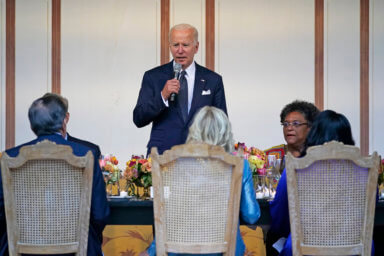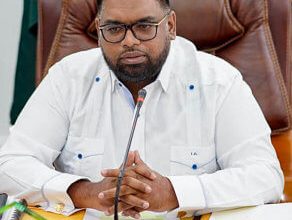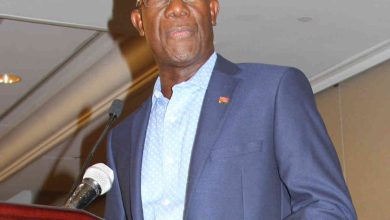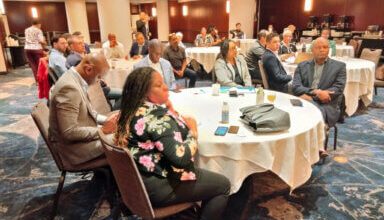Biden pledges to intensify relationship with the Caribbean

As Caribbean Community (CARICOM) leaders met in Los Angeles on Thursday with United States President Joseph Biden and Vice President Kamala Harris, the daughter of a retired Jamaican economist, Biden pledged to intensify the relationship with the Caribbean.
“And I mean that sincerely,” said Biden, as Harris welcomed him to the meeting at the Los Angeles Convention Center that also involved the president of the Dominican Republic, during the Ninth Summit of the Americas. “You’re critically important to us in every way, and I hope we’re important to you.
“And I think that there’s a means by which we can may be undo some of the damage done the previous four years, when it wasn’t very much taken seriously — the relationships,” added Biden, referring to the prior administration of President Donald J. Trump.
“But, you know, I know most of you represent middle-and high-income countries, and it’s put you in a difficult position, which cuts you off from any of the international financial tools that are out there,” he continued. “I think we’ve got some answers to be able to be significantly helpful in that regard I’d like to talk with you about in a few minutes.
“And I think that, you know, we can better prepare for natural disasters and rebuild after you get hit, increase resilience for future crises, including dealing with — there will be other pandemics that are coming down the line,” he said. “And so, there’s a lot that I think that we can and should do.”
But, at the same time, the US president said he was at the meeting primarily to hear what was on the leaders’ minds.
“This is a partnership,” he said. “It’s not — I’m not — we’re not here to dictate. We’re here to — I’m here to learn, as well as to tell you what we’re prepared to do and what — you can ask me additional things you think we should or shouldn’t be doing.”
Biden said his administration can work with the leaders to strengthen the region’s ability to adapt to climate change, and improve collaboration at the government-to-government level on greater private investment from around the world and from the United States and the hemisphere.
He said the new US-Caribbean Partnership to Address the Climate Crisis, which was launched during the Summit earlier on Thursday, is “going to help enhance your climate resilience and your energy security; and to meet some sustainable development goals.
“So, I think there’s an awful lot we can do. And I think as — as the gentlelady from Barbados will tell you — we discussed this at the climate conference there,” said President Biden, alluding to Barbados Prime Minister Mia Mottley, who was among eight CARICOM leaders attending the Summit.
“You know, I think we have to understand that the major countries of the world, not just us, have an obligation to help the rest of the world — not just the Caribbean, but the African continent and other places — to deal with the consequences of the damage done by climate by the wealthy countries,” he added. “Why, we’ve — because we’ve developed — we’ve cleared our land, we planted, we — you know, we’ve done all this stuff.
“The consequences of climate are going to be incredibly expensive,” Biden warned. “And I think we have an obligation to step up and help meet those obligations, meet those infrastructure changes, and so much more.
“So, that’s what I’d like to talk with you about, and I’d like to find out what’s on your mind,” he continued. “But thank you for being here. And I think, with your permission, I’d like to listen to what’s on your minds and — and maybe follow up on this as we can.”
When asked about any concerns he had about the boycott of the Summit by some leaders, including St. Vincent and the Grenadines Prime Minister Dr. Ralph E. Gonsalves, Biden responded with one word: “No.”
Gonsalves had publicly announced that he nor any other government minister will be attending the summit in protest over Washington’s decision not to invite the leaders of Cuba, Venezuela and Nicaragua.
Despite initially indicating that he will not be attending this week’s Summit, Antigua and Barbuda Prime Minister Gaston Browne said late Monday that he will be joining some of his CARICOM colleagues in participating in the event that is hosted by President Biden.
An Antigua and Barbuda Government statement said that Prime Minister Browne, whose father died over the weekend, left Tuesday for Los Angeles for the summit that ends on Friday.
“Prime Minister Browne who had initially indicated that he will not be attending the Summit due to the Summit organizers’ unwillingness to invite the leadership of Cuba and Venezuela, said that CARICOM held a special caucus on the issue and decided that they should attend due to the United States softening position towards Cuba and Venezuela,” An Antigua and Barbuda Government statement said.
“We felt that, in good faith, at least, the United States has softened its position; so, we should attend,” Browne said. “We continue to advocate for additional changes. The United States would have said certain things to us in confidence. And we believe that, on that basis, that we could participate while, at the same time, agitating for additional changes – additional concessions for Cuba and Venezuela in particular.”
Browne said CARICOM leaders will use the opportunity to defend the Caribbean’s position, stating that the United States had shown some interest in the Caribbean during the height of the COVID-19 pandemic by providing vaccines and personal protective equipment (PPEs).
“I think they ought to go further,” he said. “And when you look at the fact that COVID is going to be endemic, there is going to be further economic damage on countries in the Caribbean.
“The United States should be helping us to put together a ‘post-COVID’ Marshall Plan to salvage our economies,” he added.
Browne said that the Caribbean needs “real, practical solutions” to its problems and that attendance at the summit is “an opportunity” to advocate on behalf of Caribbean people for “increased collaboration and support from the United States.”
The Antiguan leader said that one of the aims of his government at the summit will be to encourage President Biden to change the aggressive policy towards Cuba, in particular, and Venezuela.
He said that there is the need for hemispheric solidarity and not policies driven by any state in the United States, where a large percentage of Cubans reside, referring to Florida.
As Biden joined Thursday’s meeting with CARICOM leaders, Harris said: “We are in the midst of a discussion — a family conversation — with our colleagues, our friends who are members of CARICOM and, of course, the Dominican Republic.
“We have been engaged in a very candid conversation about the challenges that this region — our neighbors in this region are experiencing — an urgent need for resources, for collaboration, for cooperation, and for consideration of the challenges they face — and a way that we will help,” she said. “And the range of topics has included the imminent, urgent matter of food insecurity.
“It has been about the development of climate finance and getting rid of some of the obstacles to access to finance for these nations — obstacles which I believe that some are unnecessary and can be eliminated,” the US vice president added. “And also, we have talked about security issues. And. in particular, one of the last points that was made about — was made about guns — and something that you are an extraordinary leader on, of course, in our country — and the need to take that seriously in terms of the trafficking of guns and what that has meant for these countries.”
Harris said she underscored, earlier in the meeting with CARICOM leaders, Biden’s “commitment, as president, to putting time and resources into strengthening this relationship, because we are neighbors, and these countries are important to us for many reasons that include a shared history and shared values.”
“As neighbors in the Western Hemisphere, the United States shares common bonds and interests with Caribbean nations,” she said. “As I said when we convened six weeks ago, our partnership is key to our shared prosperity and security.
“Today, our main focus will be the climate crisis, which, of course, is an existential crisis for our entire planet, and the Caribbean is on the front line of this crisis,” Harris warned.
“In our last meeting, we discussed your priorities as it relates to this issue and many others,” she added. “And I indicated that the United States would look into these issues and work with you as we seek to resolve the challenges that each of our nations are presented with. And I committed that we would develop a plan.”





